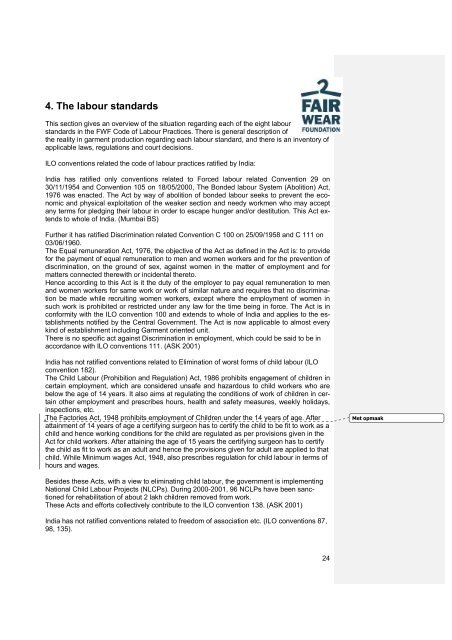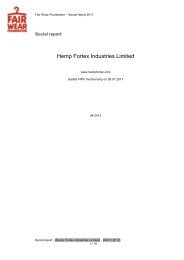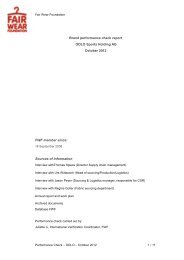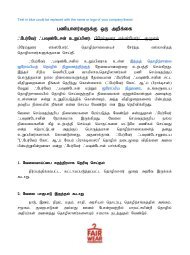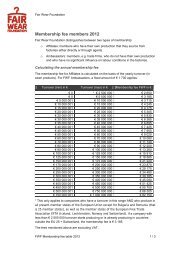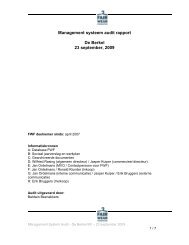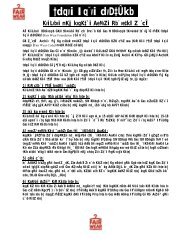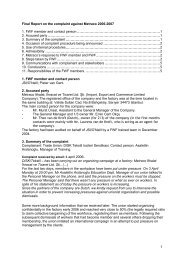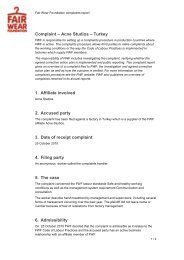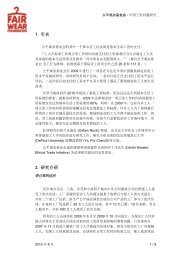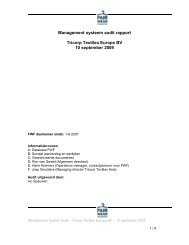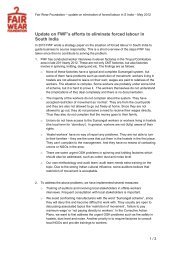Background Study Tirupur - Fair Wear Foundation
Background Study Tirupur - Fair Wear Foundation
Background Study Tirupur - Fair Wear Foundation
You also want an ePaper? Increase the reach of your titles
YUMPU automatically turns print PDFs into web optimized ePapers that Google loves.
4. The labour standards<br />
This section gives an overview of the situation regarding each of the eight labour<br />
standards in the FWF Code of Labour Practices. There is general description of<br />
the reality in garment production regarding each labour standard, and there is an inventory of<br />
applicable laws, regulations and court decisions.<br />
ILO conventions related the code of labour practices ratified by India:<br />
India has ratified only conventions related to Forced labour related Convention 29 on<br />
30/11/1954 and Convention 105 on 18/05/2000, The Bonded labour System (Abolition) Act,<br />
1976 was enacted. The Act by way of abolition of bonded labour seeks to prevent the economic<br />
and physical exploitation of the weaker section and needy workmen who may accept<br />
any terms for pledging their labour in order to escape hunger and/or destitution. This Act extends<br />
to whole of India. (Mumbai BS)<br />
Further it has ratified Discrimination related Convention C 100 on 25/09/1958 and C 111 on<br />
03/06/1960.<br />
The Equal remuneration Act, 1976, the objective of the Act as defined in the Act is: to provide<br />
for the payment of equal remuneration to men and women workers and for the prevention of<br />
discrimination, on the ground of sex, against women in the matter of employment and for<br />
matters connected therewith or incidental thereto.<br />
Hence according to this Act is it the duty of the employer to pay equal remuneration to men<br />
and women workers for same work or work of similar nature and requires that no discrimination<br />
be made while recruiting women workers, except where the employment of women in<br />
such work is prohibited or restricted under any law for the time being in force. The Act is in<br />
conformity with the ILO convention 100 and extends to whole of India and applies to the establishments<br />
notified by the Central Government. The Act is now applicable to almost every<br />
kind of establishment including Garment oriented unit.<br />
There is no specific act against Discrimination in employment, which could be said to be in<br />
accordance with ILO conventions 111. (ASK 2001)<br />
India has not ratified conventions related to Elimination of worst forms of child labour (ILO<br />
convention 182).<br />
The Child Labour (Prohibition and Regulation) Act, 1986 prohibits engagement of children in<br />
certain employment, which are considered unsafe and hazardous to child workers who are<br />
below the age of 14 years. It also aims at regulating the conditions of work of children in certain<br />
other employment and prescribes hours, health and safety measures, weekly holidays,<br />
inspections, etc.<br />
The Factories Act, 1948 prohibits employment of Children under the 14 years of age. After<br />
attainment of 14 years of age a certifying surgeon has to certify the child to be fit to work as a<br />
child and hence working conditions for the child are regulated as per provisions given in the<br />
Act for child workers. After attaining the age of 15 years the certifying surgeon has to certify<br />
the child as fit to work as an adult and hence the provisions given for adult are applied to that<br />
child. While Minimum wages Act, 1948, also prescribes regulation for child labour in terms of<br />
hours and wages.<br />
Besides these Acts, with a view to eliminating child labour, the government is implementing<br />
National Child Labour Projects (NLCPs). During 2000-2001, 96 NCLPs have been sanctioned<br />
for rehabilitation of about 2 lakh children removed from work.<br />
These Acts and efforts collectively contribute to the ILO convention 138. (ASK 2001)<br />
India has not ratified conventions related to freedom of association etc. (ILO conventions 87,<br />
98, 135).<br />
24<br />
Met opmaak


